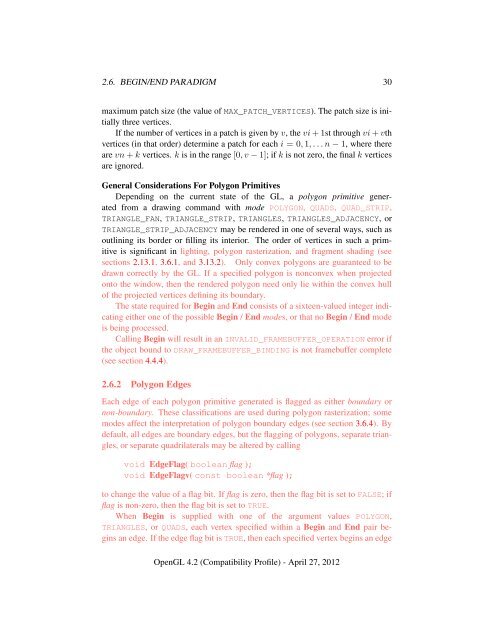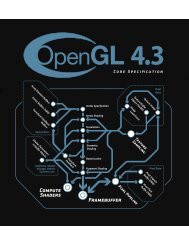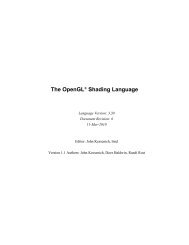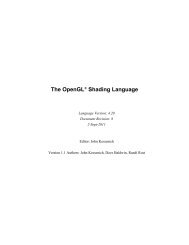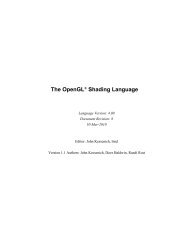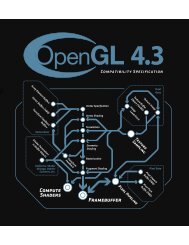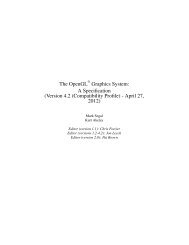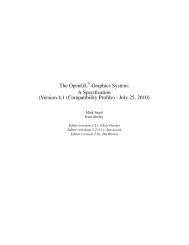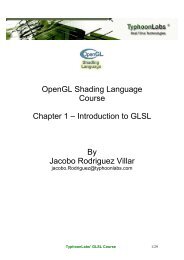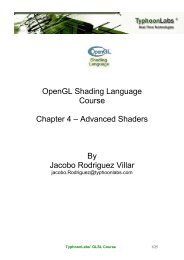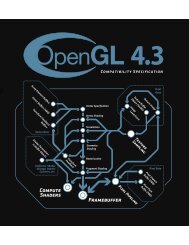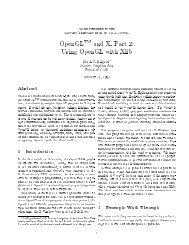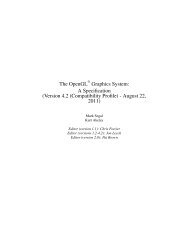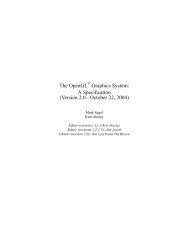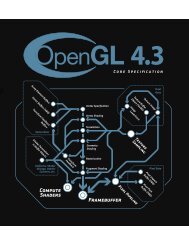- Page 1 and 2: The OpenGL R○ Graphics System: A
- Page 3 and 4: Contents 1 Introduction 1 1.1 Forma
- Page 5 and 6: CONTENTS iii 2.15 Tessellation . .
- Page 7 and 8: CONTENTS v 3.12 Fog . . . . . . . .
- Page 9 and 10: CONTENTS vii A Invariance 587 A.1 R
- Page 11 and 12: CONTENTS ix L Version 4.2 658 L.1 N
- Page 13 and 14: CONTENTS xi M.3.70 BPTC texture com
- Page 15 and 16: LIST OF FIGURES xiii 3.11 Example o
- Page 17 and 18: LIST OF TABLES xv 3.10 UNSIGNED_SHO
- Page 19 and 20: LIST OF TABLES xvii 6.29 Pixel Oper
- Page 21 and 22: Chapter 1 Introduction This documen
- Page 23 and 24: 1.5. OUR VIEW 3 available to the us
- Page 25 and 26: Chapter 2 OpenGL Operation 2.1 Open
- Page 27 and 28: 2.1. OPENGL FUNDAMENTALS 7 section
- Page 29 and 30: 2.1. OPENGL FUNDAMENTALS 9 must not
- Page 31 and 32: 2.1. OPENGL FUNDAMENTALS 11 2.1.2 F
- Page 33 and 34: 2.3. GL COMMAND SYNTAX 13 describe
- Page 35 and 36: 2.3. GL COMMAND SYNTAX 15 indicates
- Page 37 and 38: 2.4. BASIC GL OPERATION 17 Transfor
- Page 39 and 40: 2.6. BEGIN/END PARADIGM 19 To allow
- Page 41 and 42: 2.6. BEGIN/END PARADIGM 21 Vertex C
- Page 43 and 44: 2.6. BEGIN/END PARADIGM 23 2.6.1 Be
- Page 45 and 46: 2.6. BEGIN/END PARADIGM 25 vertex A
- Page 47 and 48: 2.6. BEGIN/END PARADIGM 27 Figure 2
- Page 49: 2.6. BEGIN/END PARADIGM 29 Primitiv
- Page 53 and 54: 2.7. VERTEX SPECIFICATION 33 The Te
- Page 55 and 56: 2.7. VERTEX SPECIFICATION 35 The Co
- Page 57 and 58: 2.7. VERTEX SPECIFICATION 37 generi
- Page 59 and 60: 2.8. VERTEX ARRAYS 39 indicates the
- Page 61 and 62: 2.8. VERTEX ARRAYS 41 integer value
- Page 63 and 64: 2.8. VERTEX ARRAYS 43 does not exis
- Page 65 and 66: 2.8. VERTEX ARRAYS 45 and void Enab
- Page 67 and 68: 2.8. VERTEX ARRAYS 47 array is enab
- Page 69 and 70: 2.8. VERTEX ARRAYS 49 The command v
- Page 71 and 72: 2.8. VERTEX ARRAYS 51 if (mode, cou
- Page 73 and 74: 2.8. VERTEX ARRAYS 53 } cmd->count,
- Page 75 and 76: 2.8. VERTEX ARRAYS 55 InterleavedAr
- Page 77 and 78: 2.9. BUFFER OBJECTS 57 Target name
- Page 79 and 80: 2.9. BUFFER OBJECTS 59 while used a
- Page 81 and 82: 2.9. BUFFER OBJECTS 61 void BufferS
- Page 83 and 84: 2.9. BUFFER OBJECTS 63 Name Value B
- Page 85 and 86: 2.9. BUFFER OBJECTS 65 Unmapping Bu
- Page 87 and 88: 2.9. BUFFER OBJECTS 67 binding corr
- Page 89 and 90: 2.11. RECTANGLES 69 The command voi
- Page 91 and 92: 2.12. FIXED-FUNCTION VERTEX TRANSFO
- Page 93 and 94: 2.12. FIXED-FUNCTION VERTEX TRANSFO
- Page 95 and 96: 2.12. FIXED-FUNCTION VERTEX TRANSFO
- Page 97 and 98: 2.12. FIXED-FUNCTION VERTEX TRANSFO
- Page 99 and 100: 2.12. FIXED-FUNCTION VERTEX TRANSFO
- Page 101 and 102:
2.13. FIXED-FUNCTION VERTEX LIGHTIN
- Page 103 and 104:
2.13. FIXED-FUNCTION VERTEX LIGHTIN
- Page 105 and 106:
2.13. FIXED-FUNCTION VERTEX LIGHTIN
- Page 107 and 108:
2.13. FIXED-FUNCTION VERTEX LIGHTIN
- Page 109 and 110:
2.13. FIXED-FUNCTION VERTEX LIGHTIN
- Page 111 and 112:
2.13. FIXED-FUNCTION VERTEX LIGHTIN
- Page 113 and 114:
2.14. VERTEX SHADERS 93 shader, its
- Page 115 and 116:
2.14. VERTEX SHADERS 95 If shader i
- Page 117 and 118:
2.14. VERTEX SHADERS 97 • One or
- Page 119 and 120:
2.14. VERTEX SHADERS 99 any stage.
- Page 121 and 122:
2.14. VERTEX SHADERS 101 2.14.4 Pro
- Page 123 and 124:
2.14. VERTEX SHADERS 103 been previ
- Page 125 and 126:
2.14. VERTEX SHADERS 105 • There
- Page 127 and 128:
2.14. VERTEX SHADERS 107 • A bool
- Page 129 and 130:
2.14. VERTEX SHADERS 109 2.14.6 Ver
- Page 131 and 132:
2.14. VERTEX SHADERS 111 convention
- Page 133 and 134:
2.14. VERTEX SHADERS 113 LinkProgra
- Page 135 and 136:
2.14. VERTEX SHADERS 115 Similarly,
- Page 137 and 138:
2.14. VERTEX SHADERS 117 uniformBlo
- Page 139 and 140:
2.14. VERTEX SHADERS 119 REFERENCED
- Page 141 and 142:
2.14. VERTEX SHADERS 121 of the val
- Page 143 and 144:
2.14. VERTEX SHADERS 123 OpenGL Sha
- Page 145 and 146:
2.14. VERTEX SHADERS 125 OpenGL Sha
- Page 147 and 148:
2.14. VERTEX SHADERS 127 passed to
- Page 149 and 150:
2.14. VERTEX SHADERS 129 If the val
- Page 151 and 152:
2.14. VERTEX SHADERS 131 • Member
- Page 153 and 154:
2.14. VERTEX SHADERS 133 matrix is
- Page 155 and 156:
2.14. VERTEX SHADERS 135 Additional
- Page 157 and 158:
2.14. VERTEX SHADERS 137 for the sh
- Page 159 and 160:
2.14. VERTEX SHADERS 139 2.14.9 Sam
- Page 161 and 162:
2.14. VERTEX SHADERS 141 ponents. F
- Page 163 and 164:
2.14. VERTEX SHADERS 143 • any va
- Page 165 and 166:
2.14. VERTEX SHADERS 145 • Per ve
- Page 167 and 168:
2.14. VERTEX SHADERS 147 • the co
- Page 169 and 170:
2.14. VERTEX SHADERS 149 Texture lo
- Page 171 and 172:
2.14. VERTEX SHADERS 151 • the ve
- Page 173 and 174:
2.14. VERTEX SHADERS 153 The INVALI
- Page 175 and 176:
2.14. VERTEX SHADERS 155 fragment s
- Page 177 and 178:
2.14. VERTEX SHADERS 157 command th
- Page 179 and 180:
2.14. VERTEX SHADERS 159 accessed t
- Page 181 and 182:
2.15. TESSELLATION 161 • A boolea
- Page 183 and 184:
2.15. TESSELLATION 163 output varia
- Page 185 and 186:
2.15. TESSELLATION 165 Tessellation
- Page 187 and 188:
2.15. TESSELLATION 167 variables. U
- Page 189 and 190:
2.15. TESSELLATION 169 tive influen
- Page 191 and 192:
2.15. TESSELLATION 171 are typicall
- Page 193 and 194:
2.15. TESSELLATION 173 Figure 2.14.
- Page 195 and 196:
2.15. TESSELLATION 175 and horizont
- Page 197 and 198:
2.15. TESSELLATION 177 second outer
- Page 199 and 200:
2.15. TESSELLATION 179 Tessellation
- Page 201 and 202:
2.15. TESSELLATION 181 vertex being
- Page 203 and 204:
2.16. GEOMETRY SHADERS 183 2.16 Geo
- Page 205 and 206:
2.16. GEOMETRY SHADERS 185 Geometry
- Page 207 and 208:
2.16. GEOMETRY SHADERS 187 • Fron
- Page 209 and 210:
2.16. GEOMETRY SHADERS 189 • Stru
- Page 211 and 212:
2.16. GEOMETRY SHADERS 191 The buil
- Page 213 and 214:
2.17. COORDINATE TRANSFORMATIONS 19
- Page 215 and 216:
2.17. COORDINATE TRANSFORMATIONS 19
- Page 217 and 218:
2.18. ASYNCHRONOUS QUERIES 197 Each
- Page 219 and 220:
2.19. CONDITIONAL RENDERING 199 2.1
- Page 221 and 222:
2.20. TRANSFORM FEEDBACK 201 return
- Page 223 and 224:
2.20. TRANSFORM FEEDBACK 203 Transf
- Page 225 and 226:
2.20. TRANSFORM FEEDBACK 205 may be
- Page 227 and 228:
2.21. PRIMITIVE QUERIES 207 void Dr
- Page 229 and 230:
2.22. FLATSHADING 209 Primitive typ
- Page 231 and 232:
2.23. PRIMITIVE CLIPPING 211 the pl
- Page 233 and 234:
2.24. FINAL COLOR PROCESSING 213 2.
- Page 235 and 236:
2.25. CURRENT RASTER POSITION 215 f
- Page 237 and 238:
2.25. CURRENT RASTER POSITION 217 s
- Page 239 and 240:
219 Fixed function or fragment shad
- Page 241 and 242:
3.3. ANTIALIASING 221 In RGBA mode,
- Page 243 and 244:
3.3. ANTIALIASING 223 void GetMulti
- Page 245 and 246:
3.4. POINTS 225 size specifies the
- Page 247 and 248:
3.4. POINTS 227 with the vertex cor
- Page 249 and 250:
3.4. POINTS 229 6.0 5.0 4.0 3.0 2.0
- Page 251 and 252:
3.4. POINTS 231 where size is the p
- Page 253 and 254:
¦ ¦ ¦ ¦ ¦ ¦ ¦ ¦ ¦ ¦ ¦ ¦
- Page 255 and 256:
3.5. LINE SEGMENTS 235 Line Stipple
- Page 257 and 258:
3.5. LINE SEGMENTS 237 Figure 3.6.
- Page 259 and 260:
3.6. POLYGONS 239 3.6.1 Basic Polyg
- Page 261 and 262:
3.6. POLYGONS 241 For a polygon wit
- Page 263 and 264:
3.6. POLYGONS 243 3.6.5 Depth Offse
- Page 265 and 266:
3.7. PIXEL RECTANGLES 245 polygon r
- Page 267 and 268:
3.7. PIXEL RECTANGLES 247 3.7.2 The
- Page 269 and 270:
3.7. PIXEL RECTANGLES 249 Map Name
- Page 271 and 272:
3.7. PIXEL RECTANGLES 251 The color
- Page 273 and 274:
3.7. PIXEL RECTANGLES 253 In additi
- Page 275 and 276:
3.7. PIXEL RECTANGLES 255 Special f
- Page 277 and 278:
3.7. PIXEL RECTANGLES 257 Histogram
- Page 279 and 280:
¡ ¡ ¡ ¡ ¡ ¡ ¡ ¡ ¡ ¡ ¡ ¡
- Page 281 and 282:
3.7. PIXEL RECTANGLES 261 type Para
- Page 283 and 284:
3.7. PIXEL RECTANGLES 263 Element S
- Page 285 and 286:
3.7. PIXEL RECTANGLES 265 type Para
- Page 287 and 288:
3.7. PIXEL RECTANGLES 267 UNSIGNED_
- Page 289 and 290:
3.7. PIXEL RECTANGLES 269 FLOAT_32_
- Page 291 and 292:
3.7. PIXEL RECTANGLES 271 Conversio
- Page 293 and 294:
3.7. PIXEL RECTANGLES 273 For integ
- Page 295 and 296:
3.7. PIXEL RECTANGLES 275 Arithmeti
- Page 297 and 298:
3.7. PIXEL RECTANGLES 277 The inter
- Page 299 and 300:
3.7. PIXEL RECTANGLES 279 Border Mo
- Page 301 and 302:
3.7. PIXEL RECTANGLES 281 where C[i
- Page 303 and 304:
3.7. PIXEL RECTANGLES 283 B i and A
- Page 305 and 306:
¡ ¡ ¡ ¡ ¡ ¡ 3.8. BITMAPS 285
- Page 307 and 308:
3.10. TEXTURING 287 not be performe
- Page 309 and 310:
3.10. TEXTURING 289 a texture matri
- Page 311 and 312:
3.10. TEXTURING 291 returns TRUE if
- Page 313 and 314:
3.10. TEXTURING 293 if TEXTURE_WRAP
- Page 315 and 316:
3.10. TEXTURING 295 parameter UNPAC
- Page 317 and 318:
3.10. TEXTURING 297 Generic compres
- Page 319 and 320:
3.10. TEXTURING 299 N is the number
- Page 321 and 322:
3.10. TEXTURING 301 Sized internal
- Page 323 and 324:
3.10. TEXTURING 303 Sized Base D S
- Page 325 and 326:
3.10. TEXTURING 305 Thus the last t
- Page 327 and 328:
3.10. TEXTURING 307 of TEXTURE_CUBE
- Page 329 and 330:
3.10. TEXTURING 309 1.0 5.0 4 3 t v
- Page 331 and 332:
3.10. TEXTURING 311 index values fr
- Page 333 and 334:
3.10. TEXTURING 313 counterparts. A
- Page 335 and 336:
3.10. TEXTURING 315 If the internal
- Page 337 and 338:
3.10. TEXTURING 317 by b s , b w ,
- Page 339 and 340:
3.10. TEXTURING 319 • data points
- Page 341 and 342:
3.10. TEXTURING 321 FORMAT, and TEX
- Page 343 and 344:
3.10. TEXTURING 323 If either width
- Page 345 and 346:
3.10. TEXTURING 325 Internal format
- Page 347 and 348:
3.10. TEXTURING 327 Name Type Legal
- Page 349 and 350:
3.10. TEXTURING 329 Major Axis Dire
- Page 351 and 352:
3.10. TEXTURING 331 Scale Factor an
- Page 353 and 354:
3.10. TEXTURING 333 where ∆x = x
- Page 355 and 356:
3.10. TEXTURING 335 If the selected
- Page 357 and 358:
3.10. TEXTURING 337 Figure 3.11. An
- Page 359 and 360:
3.10. TEXTURING 339 where max(1,
- Page 361 and 362:
3.10. TEXTURING 341 The internal fo
- Page 363 and 364:
3.10. TEXTURING 343 A cube map arra
- Page 365 and 366:
3.10. TEXTURING 345 and maximum lev
- Page 367 and 368:
3.10. TEXTURING 347 • If executin
- Page 369 and 370:
3.10. TEXTURING 349 • target is n
- Page 371 and 372:
3.10. TEXTURING 351 When target is
- Page 373 and 374:
3.10. TEXTURING 353 Texture Base RE
- Page 375 and 376:
3.10. TEXTURING 355 SRCn_RGB OPERAN
- Page 377 and 378:
3.10. TEXTURING 357 If the value of
- Page 379 and 380:
3.10. TEXTURING 359 bound texture i
- Page 381 and 382:
3.10. TEXTURING 361 state, all text
- Page 383 and 384:
3.10. TEXTURING 363 Texture target
- Page 385 and 386:
3.10. TEXTURING 365 unit, as enumer
- Page 387 and 388:
3.10. TEXTURING 367 • reading the
- Page 389 and 390:
3.12. FOG 369 Color sum is enabled
- Page 391 and 392:
3.13. FRAGMENT SHADERS 371 sections
- Page 393 and 394:
3.13. FRAGMENT SHADERS 373 A fragme
- Page 395 and 396:
3.13. FRAGMENT SHADERS 375 as follo
- Page 397 and 398:
3.13. FRAGMENT SHADERS 377 The buil
- Page 399 and 400:
3.13. FRAGMENT SHADERS 379 void Bin
- Page 401 and 402:
3.14. ANTIALIASING APPLICATION 381
- Page 403 and 404:
383 the GL context, the framebuffer
- Page 405 and 406:
4.1. PER-FRAGMENT OPERATIONS 385 th
- Page 407 and 408:
4.1. PER-FRAGMENT OPERATIONS 387 Al
- Page 409 and 410:
4.1. PER-FRAGMENT OPERATIONS 389 vo
- Page 411 and 412:
4.1. PER-FRAGMENT OPERATIONS 391 ba
- Page 413 and 414:
4.1. PER-FRAGMENT OPERATIONS 393 Bl
- Page 415 and 416:
4.1. PER-FRAGMENT OPERATIONS 395 Mo
- Page 417 and 418:
4.1. PER-FRAGMENT OPERATIONS 397 Fu
- Page 419 and 420:
4.1. PER-FRAGMENT OPERATIONS 399 is
- Page 421 and 422:
4.1. PER-FRAGMENT OPERATIONS 401 Ar
- Page 423 and 424:
4.2. WHOLE FRAMEBUFFER OPERATIONS 4
- Page 425 and 426:
4.2. WHOLE FRAMEBUFFER OPERATIONS 4
- Page 427 and 428:
4.2. WHOLE FRAMEBUFFER OPERATIONS 4
- Page 429 and 430:
4.2. WHOLE FRAMEBUFFER OPERATIONS 4
- Page 431 and 432:
4.2. WHOLE FRAMEBUFFER OPERATIONS 4
- Page 433 and 434:
4.3. DRAWING, READING, AND COPYING
- Page 435 and 436:
¡ ¡ ¡ ¡ ¡ ¡ ¡ ¡ ¡ ¡ ¡ ¡
- Page 437 and 438:
4.3. DRAWING, READING, AND COPYING
- Page 439 and 440:
4.3. DRAWING, READING, AND COPYING
- Page 441 and 442:
4.3. DRAWING, READING, AND COPYING
- Page 443 and 444:
4.3. DRAWING, READING, AND COPYING
- Page 445 and 446:
4.3. DRAWING, READING, AND COPYING
- Page 447 and 448:
4.4. FRAMEBUFFER OBJECTS 427 4.3.4
- Page 449 and 450:
4.4. FRAMEBUFFER OBJECTS 429 Frameb
- Page 451 and 452:
4.4. FRAMEBUFFER OBJECTS 431 • A
- Page 453 and 454:
4.4. FRAMEBUFFER OBJECTS 433 Sized
- Page 455 and 456:
4.4. FRAMEBUFFER OBJECTS 435 set to
- Page 457 and 458:
4.4. FRAMEBUFFER OBJECTS 437 TEXTUR
- Page 459 and 460:
4.4. FRAMEBUFFER OBJECTS 439 • If
- Page 461 and 462:
4.4. FRAMEBUFFER OBJECTS 441 For th
- Page 463 and 464:
4.4. FRAMEBUFFER OBJECTS 443 • im
- Page 465 and 466:
4.4. FRAMEBUFFER OBJECTS 445 • At
- Page 467 and 468:
4.4. FRAMEBUFFER OBJECTS 447 4.4.5
- Page 469 and 470:
4.4. FRAMEBUFFER OBJECTS 449 Layer
- Page 471 and 472:
Chapter 5 Special Functions This ch
- Page 473 and 474:
5.1. EVALUATORS 453 Integers Reals
- Page 475 and 476:
5.1. EVALUATORS 455 The second way
- Page 477 and 478:
5.2. SELECTION 457 EvalCoord2(p *
- Page 479 and 480:
5.3. FEEDBACK 459 of each primitive
- Page 481 and 482:
5.4. TIMER QUERIES 461 Type coordin
- Page 483 and 484:
5.5. DISPLAY LISTS 463 started or s
- Page 485 and 486:
5.5. DISPLAY LISTS 465 provides an
- Page 487 and 488:
5.5. DISPLAY LISTS 467 Framebuffer
- Page 489 and 490:
5.7. SYNC OBJECTS AND FENCES 469 Pr
- Page 491 and 492:
5.7. SYNC OBJECTS AND FENCES 471 If
- Page 493 and 494:
5.8. HINTS 473 Target PERSPECTIVE_C
- Page 495 and 496:
6.1. QUERYING GL STATE 475 void Get
- Page 497 and 498:
6.1. QUERYING GL STATE 477 6.1.3 En
- Page 499 and 500:
6.1. QUERYING GL STATE 479 target m
- Page 501 and 502:
6.1. QUERYING GL STATE 481 • form
- Page 503 and 504:
6.1. QUERYING GL STATE 483 When the
- Page 505 and 506:
6.1. QUERYING GL STATE 485 format N
- Page 507 and 508:
6.1. QUERYING GL STATE 487 target m
- Page 509 and 510:
6.1. QUERYING GL STATE 489 resets a
- Page 511 and 512:
6.1. QUERYING GL STATE 491 names, a
- Page 513 and 514:
6.1. QUERYING GL STATE 493 void Get
- Page 515 and 516:
6.1. QUERYING GL STATE 495 To query
- Page 517 and 518:
6.1. QUERYING GL STATE 497 returns
- Page 519 and 520:
6.1. QUERYING GL STATE 499 which ha
- Page 521 and 522:
6.1. QUERYING GL STATE 501 tion att
- Page 523 and 524:
6.1. QUERYING GL STATE 503 obtain t
- Page 525 and 526:
6.1. QUERYING GL STATE 505 returns
- Page 527 and 528:
6.1. QUERYING GL STATE 507 • If p
- Page 529 and 530:
6.1. QUERYING GL STATE 509 If pname
- Page 531 and 532:
6.1. QUERYING GL STATE 511 Stack At
- Page 533 and 534:
6.2. STATE TABLES 513 Type code Exp
- Page 535 and 536:
6.2. STATE TABLES 515 Get value Typ
- Page 537 and 538:
6.2. STATE TABLES 517 Get value Typ
- Page 539 and 540:
6.2. STATE TABLES 519 Get value Typ
- Page 541 and 542:
6.2. STATE TABLES 521 Get value Typ
- Page 543 and 544:
6.2. STATE TABLES 523 Get value Typ
- Page 545 and 546:
6.2. STATE TABLES 525 Get value Typ
- Page 547 and 548:
6.2. STATE TABLES 527 Get value Typ
- Page 549 and 550:
6.2. STATE TABLES 529 Get value Typ
- Page 551 and 552:
6.2. STATE TABLES 531 Get value Typ
- Page 553 and 554:
6.2. STATE TABLES 533 Get value Typ
- Page 555 and 556:
6.2. STATE TABLES 535 Get value Typ
- Page 557 and 558:
6.2. STATE TABLES 537 Get Command I
- Page 559 and 560:
6.2. STATE TABLES 539 Get value Typ
- Page 561 and 562:
6.2. STATE TABLES 541 Get value Typ
- Page 563 and 564:
6.2. STATE TABLES 543 Get value Typ
- Page 565 and 566:
6.2. STATE TABLES 545 Get value Typ
- Page 567 and 568:
6.2. STATE TABLES 547 Get value Typ
- Page 569 and 570:
6.2. STATE TABLES 549 Get value Typ
- Page 571 and 572:
6.2. STATE TABLES 551 Get value Typ
- Page 573 and 574:
6.2. STATE TABLES 553 Get Command I
- Page 575 and 576:
6.2. STATE TABLES 555 Get value Typ
- Page 577 and 578:
6.2. STATE TABLES 557 Get value Typ
- Page 579 and 580:
6.2. STATE TABLES 559 Get value Typ
- Page 581 and 582:
6.2. STATE TABLES 561 Get value Typ
- Page 583 and 584:
6.2. STATE TABLES 563 Get value Typ
- Page 585 and 586:
6.2. STATE TABLES 565 Get value Typ
- Page 587 and 588:
6.2. STATE TABLES 567 Get value Typ
- Page 589 and 590:
6.2. STATE TABLES 569 Get Command M
- Page 591 and 592:
6.2. STATE TABLES 571 Get value Typ
- Page 593 and 594:
6.2. STATE TABLES 573 Get value Typ
- Page 595 and 596:
6.2. STATE TABLES 575 Get value Typ
- Page 597 and 598:
6.2. STATE TABLES 577 Get value Typ
- Page 599 and 600:
6.2. STATE TABLES 579 Get value Typ
- Page 601 and 602:
6.2. STATE TABLES 581 Get value Typ
- Page 603 and 604:
6.2. STATE TABLES 583 Get value Typ
- Page 605 and 606:
6.2. STATE TABLES 585 Get value Typ
- Page 607 and 608:
Appendix A Invariance The OpenGL sp
- Page 609 and 610:
A.3. INVARIANCE RULES 589 • Sciss
- Page 611 and 612:
A.4. TESSELLATION INVARIANCE 591
- Page 613 and 614:
A.5. ATOMIC COUNTER INVARIANCE 593
- Page 615 and 616:
Appendix B Corollaries The followin
- Page 617 and 618:
597 16. ColorMaterial has no effect
- Page 619 and 620:
C.1. RGTC COMPRESSED TEXTURE IMAGE
- Page 621 and 622:
C.2. BPTC COMPRESSED TEXTURE IMAGE
- Page 623 and 624:
C.2. BPTC COMPRESSED TEXTURE IMAGE
- Page 625 and 626:
C.2. BPTC COMPRESSED TEXTURE IMAGE
- Page 627 and 628:
C.2. BPTC COMPRESSED TEXTURE IMAGE
- Page 629 and 630:
C.2. BPTC COMPRESSED TEXTURE IMAGE
- Page 631 and 632:
C.2. BPTC COMPRESSED TEXTURE IMAGE
- Page 633 and 634:
Appendix D Shared Objects and Multi
- Page 635 and 636:
D.2. SYNC OBJECTS AND MULTIPLE CONT
- Page 637 and 638:
D.3. PROPAGATING CHANGES TO OBJECTS
- Page 639 and 640:
Appendix E Profiles and the Depreca
- Page 641 and 642:
E.2. DEPRECATED AND REMOVED FEATURE
- Page 643 and 644:
E.2. DEPRECATED AND REMOVED FEATURE
- Page 645 and 646:
E.2. DEPRECATED AND REMOVED FEATURE
- Page 647 and 648:
F.2. DEPRECATION MODEL 627 • Fine
- Page 649 and 650:
F.4. CHANGE LOG 629 • Changed Cle
- Page 651 and 652:
F.5. CREDITS AND ACKNOWLEDGEMENTS 6
- Page 653 and 654:
Appendix G Version 3.1 OpenGL versi
- Page 655 and 656:
G.4. CREDITS AND ACKNOWLEDGEMENTS 6
- Page 657 and 658:
G.4. CREDITS AND ACKNOWLEDGEMENTS 6
- Page 659 and 660:
H.2. DEPRECATION MODEL 639 • BGRA
- Page 661 and 662:
H.4. CHANGE LOG 641 • Change flat
- Page 663 and 664:
H.5. CREDITS AND ACKNOWLEDGEMENTS 6
- Page 665 and 666:
Appendix I Version 3.3 OpenGL versi
- Page 667 and 668:
I.3. CHANGE LOG 647 I.3 Change Log
- Page 669 and 670:
Appendix J Version 4.0 OpenGL versi
- Page 671 and 672:
J.2. DEPRECATION MODEL 651 (GL_ARB_
- Page 673 and 674:
J.4. CREDITS AND ACKNOWLEDGEMENTS 6
- Page 675 and 676:
K.2. DEPRECATION MODEL 655 • Abil
- Page 677 and 678:
K.5. CREDITS AND ACKNOWLEDGEMENTS 6
- Page 679 and 680:
L.2. DEPRECATION MODEL 659 • Inst
- Page 681 and 682:
L.4. CHANGE LOG 661 • Change core
- Page 683 and 684:
L.4. CHANGE LOG 663 • Add error c
- Page 685 and 686:
L.4. CHANGE LOG 665 • Add multisa
- Page 687 and 688:
L.4. CHANGE LOG 667 • Remove clam
- Page 689 and 690:
L.5. CREDITS AND ACKNOWLEDGEMENTS 6
- Page 691 and 692:
M.3. ARB EXTENSIONS 671 combination
- Page 693 and 694:
M.3. ARB EXTENSIONS 673 M.3.6 Textu
- Page 695 and 696:
M.3. ARB EXTENSIONS 675 M.3.21 Low-
- Page 697 and 698:
M.3. ARB EXTENSIONS 677 The name st
- Page 699 and 700:
M.3. ARB EXTENSIONS 679 The name st
- Page 701 and 702:
M.3. ARB EXTENSIONS 681 M.3.53 Fast
- Page 703 and 704:
M.3. ARB EXTENSIONS 683 M.3.65 Cube
- Page 705 and 706:
M.3. ARB EXTENSIONS 685 M.3.76 RGB1
- Page 707 and 708:
M.3. ARB EXTENSIONS 687 M.3.90 Sepa
- Page 709 and 710:
M.3. ARB EXTENSIONS 689 introduced
- Page 711 and 712:
Index x, 549 x BIAS, 248, 545 x BIT
- Page 713 and 714:
INDEX 693 ATOMIC COUNTER BUFFER REF
- Page 715 and 716:
INDEX 695 ClearBuffer*, 199, 220, 4
- Page 717 and 718:
INDEX 697 CompressedTexSubImage, 66
- Page 719 and 720:
INDEX 699 DEPTH STENCIL ATTACHMENT,
- Page 721 and 722:
INDEX 701 558 equal spacing, 169 EQ
- Page 723 and 724:
INDEX 703 LAYER TARGETS, 444 FRAMEB
- Page 725 and 726:
INDEX 705 GetPixelMap, 477, 549 Get
- Page 727 and 728:
INDEX 707 GL ARB shader bit encodin
- Page 729 and 730:
INDEX 709 gl BackColor, 106 gl Back
- Page 731 and 732:
INDEX 711 304, 327, 328, 352, 353,
- Page 733 and 734:
INDEX 713 LIST BIT, 511 LIST INDEX,
- Page 735 and 736:
INDEX 715 394, 396, 405, 407, 411,
- Page 737 and 738:
INDEX 717 141, 577, 621, 628, 639 M
- Page 739 and 740:
INDEX 719 OR, 401 OR INVERTED, 401
- Page 741 and 742:
INDEX 721 SCALE, 281 PREVIOUS, 355,
- Page 743 and 744:
INDEX 723 RENDER, 458, 459, 586 REN
- Page 745 and 746:
INDEX 725 SampleCoverage, 388, 660
- Page 747 and 748:
INDEX 727 STENCIL BACK PASS DEPTH -
- Page 749 and 750:
INDEX 729 TEXTURE BINDING xD, 529 T
- Page 751 and 752:
INDEX 731 157 TEXTURE WIDTH, 315, 3
- Page 753 and 754:
INDEX 733 UNIFORM BUFFER START, 495
- Page 755 and 756:
INDEX 735 uvec3, 110, 122 uvec4, 11


